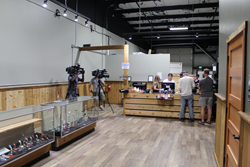
London, UK (PRWEB) January 11, 2012
Today a large number of alternative food products carry the potential to enter the U.S. market at a later date on a commercial scale, either through domestic production or importation. The total U.S. retail sales of dairy alternative beverages are estimated to have reached $ 1.33 billion in 2011.
Consumers choose plant-based dairy alternative beverages for numerous reasons. Health issues including lactose intolerance, milk allergy, and the genetic disorder phenylketonuria (PKU) can be addressed through the consumption of dairy alternative beverages because these plant-based milks are free of animal proteins, in particular casein. Currently, the most commonly known and popular of the commercial plant milks is soymilk. Following in consumer recognition and consumption are almond milk, rice milk and coconut milk, in that order of preference.
New market research report “Dairy Alternative Beverages in the U.S.: Soy Milk, Almond Milk, Rice Milk and other Dairy Milk Alternatives” provided by Packaged Facts has been recently published by Market Publishers Ltd.
Report Details:
Title: Dairy Alternative Beverages in the U.S.: Soy Milk, Almond Milk, Rice Milk and other Dairy Milk Alternatives
Published: January, 2012
Pages: 212
Price: US$ 3,500
http://marketpublishers.com/report/consumers_goods/food_beverage/dairy_alternative_beverages_in_us_soy_milk_almond_milk_rice_milk_n_other_dairy_milk_alternatives.html
The study examines the U.S. market for plant-based, ready-to-drink (RTD) beverages that are alternative substitutes for dairy milk, sold to consumers at retail. It estimates and analyzes the size, growth rate, and composition of the market. Historical data, as well as market projections to 2016, are provided for soymilk, almond milk, rice milk, coconut milk and hemp milk, as well as coverage of minor products such as flax, hazelnut, multi-grain, oat and sunflower milks. Strategic analyses of competitors in this market are included, along with descriptions of recently introduced products. Trends and regulations influencing this market are discussed.
Report Contents:
CHAPTER 1 EXECUTIVE SUMMARY
Scope and Methodology
Scope of Report
Exclusions
Report Methodology
The Products
Consumer Health Awareness Drives Plant-Based Beverage Market
Marketers of Plant Milks Focus on “Natural” and “Organic” Products
Dietitians Heartily Support the Health Benefits of Plant-based Beverages
Plant Milks Have Been Consumed for Centuries
Consumers Choose Plant-Based Milks for a Number of Reasons
Soymilk
Health Impact
Almond Milk
Rice Milk
Hemp Milk
Coconut Milk
Additional Varieties of Dairy Alternative Beverages
Size and Growth of the Market
2011 U.S. Retail Sales Estimated at $ 1.33 Billion for All Dairy Alternative Beverages
Table 1-1 U.S. Retail Sales of Dairy Alternative Beverages, 2010-2011 (in millions of dollars)
2011 U.S. Retail Sales Estimated at Just Under $ 500 Million for Leading Refrigerated Dairy Alternative Beverages
Table 1-2 U.S. Retail Sales of Leading Refrigerated Dairy Alternative Beverages, 2010-2011 (in millions of dollars)
2011 U.S. Retail Sales Estimated at $ 115 Million for Leading Shelf-Stable Dairy Alternative Beverages
Table 1-3 U.S. Retail Sales of Leading Shelf-Stable Dairy Alternative Beverages, 2010-2011 (in millions of dollars)
Packaged Facts Projects 2012 U.S. Retail Sales of Dairy Alternative Beverages at $ 1.38 Billion
Table 1-4 Projected U.S. Retail Sales of Dairy Alternative Beverages, 2012 (in millions of dollars)
U.S. Dairy Alternative Beverage Retail Sales Projected Exceed $ 1.7 Billion in 2016
Table 1-5 U.S. Retail Sales of Dairy Alternative Beverages, 2007-2016 (in millions of dollars)
The Marketers
Private Label Products Move Front and Center
Marketers Introduce Single-Serve Dairy Alternative Beverages
The Dairy Alternative Beverage Market Primarily Comprises Small, Private Companies
Marketers of Dairy Alternative Beverages Respond to Consumer Health, Social and Ethical Concerns
Regulatory Policy and Legislative Issues
The Food and Drug Administration Endorses the Health Benefits of Soy
The Role of Isoflavones in Health
The Food Allergen Labeling and Consumer Protection Act of 2004
The USDA Position on the Term “Natural”
The USDA Requirements for a Food or Beverage to Be Labeled “Organic”
National Milk Producers Federation Petitions the FDA to Prohibit Use of the Word “Milk” Relating to Plant-Based Beverages
Trends and New Products
51 Dairy Alternative Beverages Introduced to the U.S. Market Between January 1, 2007 and December 31, 2011
Table 1-6 Number of Dairy Alternative Beverage Product Introductions in the United States, 2007-2011
New Packaging Technologies
Dairy Alternative Beverages Enter the Espresso Mainstream
The Consumer
Consumers Have Increased Consumption of Dairy Alternative Beverages in the Past Five Years, With a Shift From Soymilk and Rice Milk to Almond Milk
Almond Milk Gaining on Soymilk for Most Popular Dairy Alternative Beverage
Table 1-7 Response to Question: “Which Milk Alternatives Do You Drink/Use?,” 2011 (percent)
Half of Product Users Consumed Soymilk Five Years Age, Compared to 21% Who Consumed Almond Milk Five Years Ago
Table 1-8 Response to Questions About Milk Alternative Consumption Trends, 2011 (percent of product users)
Consumption of All Dairy Alternative Beverages Increases Substantially from 2006 to 2011, With Almond Milk Seeing the Biggest Gain
Table 1-9 Response to Questions About Milk Alternative Use Five Years Ago, 2011 (percent of product users)
Silk Soy Milk Leads the Pack As the Dairy Alternative Beverage Purchased Most Often by Consumers
Table 1-10 Response to Question: Which Brand(s) of Milk Alternatives Do You Purchase Most Often?, 2011
CHAPTER 2 THE PRODUCTS
Key Points
Scope and Methodology
Scope of Report
Exclusions
Report Methodology
Overview
First Plant-Based Beverage Introduced in 1983
Consumer Health Awareness Drives Plant-Based Beverage Market
…
More new market research reports by the publisher can be found at Packaged Facts page.
###

